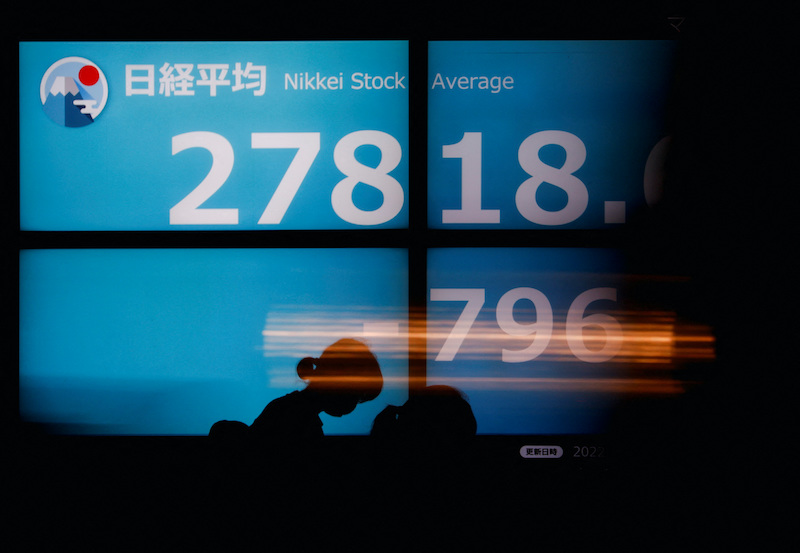Asian shares were on the slide on Tuesday, pushed back by a surprise policy shift from the Bank of Japan (BOJ) and a surge in Covid-19 cases in China which threatens to overwhelm its health system.
The yen surged and shares across the region dropped sharply after the BOJ’s decision to allow long-term interest rates to rise more, a move analysts said could signal a step towards changing Japan’s long-held yield curve control.
That came as it emerged that cities across China were scrambling to build hospital beds and fever screening clinics with the United States admitting it was concerned at Beijing’s surprise decision to let Covid run free.
Also on AF: US to Ban Use of TikTok App on Government Devices
Japan’s main stock market gauge closed at a more than two-month low and the benchmark 10-year government bond yield rose to seven-year highs after the central bank caught investors off-guard.
The Nikkei share average tumbled 2.46% to close at 26,568.03, its lowest since October 13 in its sharpest daily decline since October 11. The broader Topix lost 1.54% to 1,905.59.
“Until now, Japanese shares were firm compared with Wall Street. But going forward they will be part of the trend for major global stocks,” said Shigetoshi Kamada, general manager at the research department at Tachibana Securities.
Technology investor SoftBank Group slipped 4.85% and was the biggest drag on the Nikkei, followed by chip-making equipment Tokyo Electron, which fell 3.53%.
The banking sector rose 5.12%, highlighting the relief for investors from the BOJ decision after years of ultra-low rates that have pressured the industry’s core earnings from loans and deposits.
China Covid Crisis Deepens
Meanwhile, China stocks slumped as the country grappled with surging Covid-19 cases, while investors took no comfort from the central bank’s decision to hold firm on key lending rates.
The blue-chip CSI 300 Index was down and the Shanghai Composite Index dropped too.
“A reopening from Covid control will finally push the economy to largely recover but it still has an adverse impact on the economy in the short term,” said Central China Securities analysts in a note.
“The period might last two to three months, so the market will face near-term social and economic pressure.”
The Hang Seng Index dropped 1.33%, or 258.01 points, to 19,094.80, while the Hang Seng China Enterprises Index declined 2%.
The Shanghai Composite Index dipped 1.07%, or 33.35 points, to 3,073.77, while the Shenzhen Composite Index on China’s second exchange dropped 1.20%, or 24.12 points, to 1,979.08.
Elsewhere across the region, Australian shares extended earlier losses to be off by 1.27% in afternoon trade.
Indian stocks slid with Mumbai’s signature Nifty 50 index down 0.19%, or 35.15 points, to close at 18,385.30.
MSCI’s broadest index of Asia-Pacific shares outside Japan was down 0.9%.
Australia Hikes Interest Rates
The US dollar dropped 2.43% against the yen to 133.62 after the BOJ decision, hitting a four-month low.
In early European futures trading, the pan-region Euro Stoxx 50 futures were down 0.89% at 3,784, German DAX futures were down 0.91% at 13,888 and FTSE futures were down 0.63% at 7,321.
US stock futures, the S&P 500 e-minis, were down 0.52% at 3,825.5.
In Asian trading, the yield on benchmark 10-year Treasury notes rose to 3.6752% compared with its US close of 3.583% on Monday.
Australia’s Reserve Bank considered leaving interest rates on hold at its December 6 policy meeting, according to minutes published on Tuesday, but delivered a 25 basis point hike.
The Dow Jones Industrial Average fell 162.92 points, or 0.49%, to 32,757.54, the S&P 500 lost 34.7 points, or 0.90%, to 3,817.66 and the Nasdaq Composite dropped 159.38 points, or 1.49%, to 10,546.03. The three markets closed in the red for the fourth straight session.
The S&P 500, the Dow and the Nasdaq are on track to notch their largest annual percentage losses since 2008, the nadir of the global financial crisis.
US crude ticked up 0.7% to $75.71 a barrel. Brent crude rose to $80.44 per barrel. Spot gold was slightly higher at $1,792.29 per ounce.
Key figures
Tokyo – Nikkei 225 < DOWN 2.46% at 26,568.03 (close)
Hong Kong – Hang Seng Index < DOWN 1.33% at 19,094.80 (close)
Shanghai – Composite < DOWN 1.07% at 3,073.77 (close)
London – FTSE 100 < DOWN 0.20% at 7,346.81 (0935 GMT)
New York – Dow < DOWN 0.49% at 32,757.54 (Monday close)
- Reuters with additional editing by Sean O’Meara
Read more:
Yen Soars, Nikkei Sinks After Surprise Bank of Japan Move
China’s Rich Eye Foreign Assets Amid Shaky Domestic Outlook
Chinese Hospitals Swamped by Covid Wave, US Airs Concern























